Fashion's Anti-Fat Bias Is Prevalent as Ever, Says Virginia Sole-Smith
"What you've seen in the last few years is a real awareness in fashion that this is an issue that is trendy to seem like you care about."
Thank you for subscribing to Back Row. When I have issues like today’s, I’m especially grateful to have Substack as a platform, which allows me to publish stories without concern for what advertisers might think of them. That’s because this newsletter is entirely reader-funded, so if you like these articles and want to support the publication of more of them, I hope you’ll upgrade your subscription for $5 a month — less than what I spent on a latte in L.A. this morning — or $50 annually. Paid subscribers get two full Back Row posts per week, plus access to commenting and the full archive.
After I got off the phone with Virginia Sole-Smith last week for an interview about anti-fat bias in fashion, she DM’d me this post from Amanda Kate Richards:
“Very mad we forgot to discuss this aspect of fashion in our chat this week! Oh wait, we CAN make giant clothes… we just don’t want the fats to wear them,” Virginia said in her message.
Having worked in traditional women’s media, Virginia launched her Substack Burnt Toast as “a place to critique diet culture and combat fatphobia, without the continual compromise required by corporate media.” This is why Burnt Toast is one of my must-reads (and listens, it includes a podcast). I’m a millennial who grew up with diet culture defined by Victoria’s Secret and women’s magazines that told us to eat only half a banana at a time. I very much do not want my kids to grow up with that same toxic nonsense. Virginia’s writing is entertaining and informative, but also feels so often to me like an enormous relief to read.
I asked Virginia to talk to me before fashion month started because I wanted to get her reaction to the spring 2023 runways. I also got her take on the Met’s upcoming Karl Lagerfeld exhibition, Victoria’s Secret’s new “Undefinable” ad campaign, and much more.
Her second book, Fat Talk: Parenting in the Age of Diet Culture, is available for preorder. I encourage you to buy it now (I already bought mine) because preorders are the best way to support authors.
I was just reading that out of 247 spring 2023 runway shows, 90 included “curvy” models, up from 62 the previous season, according to data by Tagwalk. That means 36 percent of runway shows had “curvy” models, which means 64 percent thought it was completely fine to exclude them. What’s your reaction to those numbers?
First, I want know what curvy even means. Was this we put a size six on the runway and we're being super-brave? There has been this track record, particularly in high-end fashion, of only becoming a tiny bit more inclusive as opposed to actually putting fat people on your runways. Or they have one very fat person. That doesn't make progress either, because you've really just tokenized the experience of being a fat person who loves fashion. Like, We're checking that box. But what we're really here to do is make clothes for skinny people.
The bottom line is, no, I'm not super impressed; I'm also not at all surprised.
Can you talk about the role you think the fashion industry has played in perpetuating anti-fat bias?
If you want to go super-historical, ancient Greeks [were] idealizing the thin form. People always say, “Oh, but the Renaissance ladies!” And it's again a very specific type of person. Maybe they were curvier, but they still had really tiny waists. It was still an ideal that was achieved with corsets and bustles. Fashion has always been built on forcing bodies, particularly women's bodies, into a narrow ideal. That seems to me fundamental to the marketing of what they're selling, especially the brands that really rest on aspirational fashion.
Do you think the industry’s perpetuation of anti-fat bias has gotten better at all, particularly in recent years?
I'm small-fat. I wear a 16, 18, and I cannot comfortably walk into any retail experience and assume I can fit into the clothes. I for sure cannot walk into any designer experience, with the exception of maybe Mara Hoffman [and] a handful of [others]. I got some stuff from Wray, which is a very beloved-on-Instagram, fat, slow fashion brand. And I had to return everything. Even the brands that get revered for doing it well are often not, but they're marketing it effectively.
Where do you shop?
I buy 90 percent of my clothes from Universal Standard. Universal Standard is not a super-affordable brand, so you get into accessibility [issues]. I would say it’s the only brand really doing the work in an authentic way. It's priced comparably to Madewell or Anthropologie, and it's actually delivering on clothes that fat people can wear.
Designer — it's a nonstarter. Even when I was more straight-sized, I didn't really feel like I could shop in the designer world because they often don't go above an eight or a six. If you want to go to higher-end mall brands, the Madewells and J. Crews, I can't shop in their stores. I can sometimes find one or two things on their website. I return 80 percent of the things I buy. Anytime I shop, my credit card is thousands of dollars of things that I know I will have to return. I don’t even really get cranky about it anymore. But it is a ridiculous reality that I'm regularly carrying a $3,000 balance on a credit card, which [requires] so much privilege, in order to buy a $100 pair of pants.
It seems to me that if anything has gotten any better with fashion and its acceptance of fat people, it’s gotten better an infinitesimal amount.
What you've seen in the last few years is a real awareness in fashion that this is an issue that is trendy to seem like you care about, and trendy to look like you're putting some resources behind. I think it really comes down to economics. They don't want to invest in fit models and data collecting and data purchasing to really get the sizing right. So then the plus clothes don't fit particularly well. They don't market them particularly well. Consumers who have given up shopping in stores — you actually have to do some serious repair work and communication to say, “Hey, we have your stuff in the store now, we're trying to make our store a place you want to be.” As opposed to a place where you've been humiliated and shamed and walked out with just a necklace while your friends bought jeans. They actually probably do better just periodically making a big buzzy announcement and saying, “And here's Aidy Bryant dancing in a commercial!”
Consumer dissatisfaction with this whole system has been increasingly apparent over the last 20 or so years thanks to the internet — sites like Jezebel, and, in more recent years, TikTok.
I think that is the big shift. But the other piece we have to talk about is, fat consumers are more vocal and annoyed. I'm not seeing thin consumers stand up on this issue. Brands think that their thin customers don't want to shop with the fat ladies. What we really need is for thin customers to hold the brands that they shop at accountable. Because they're not going to listen to the fat ladies, right? They've already decided we're irrelevant to them. They need to know that the thin customers will walk away. And that's a whole other layer of activism we haven't tapped into yet.
In May 2018, Women’s Wear Daily printed an interview with Miuccia Prada in which she told journalist Bridget Foley, “Size diversity, again, in theory I accept, but so far I didn’t have really the courage to do it. Also…the subject is very trendy now. And that I don’t like so much. I don’t want to do it for those reasons…” Business of Fashion recently ran a profile of Paloma Elsesser, who famously appeared on an i-D cover in Miu Miu’s viral miniskirt set. That story explained, “To get Paloma into the Miu Miu mini, which the brand doesn’t make in her size, they had to cut the skirt in half and add a panel of fabric to extend its back to make it fit.” I guess I’m just raising this as an example that reinforces exactly what you’re saying.
I'm looking at Paloma in the skirt. They chose not to make that skirt big enough. There's no reason a fat person can't wear a miniskirt. They're just not putting enough fabric in it to fit over her hips. That's a shitty choice that she's made. You cannot admire someone who’s like, I won't tokenize you, so I will just pretend you don't exist. We need fashion designers to say, “It is also interesting to me to dress curves. It is interesting to me to dress a round stomach.” I’m so tired of this.
I am too. This is why so many of us are drawn to your work and podcasts like Maintenance Phase. I’m a 37-year-old millennial, and the Victoria’s Secret catalog came to my house when I was growing up, and it messed me up. I have a one and a half-year-old daughter and I don’t want her to experience that. Do you think there’s hope for the future?
I do, but I don't think the future lies in the fashion industry, I'm sorry to say. I think the power to change comes from parents like you and like me, realizing we can frame a different narrative to our kids. So we can teach our kids to look at a photo like that and ask all the questions that you and I are asking. We can teach them beauty standards are problematic and also optional.
We do need to improve the fashion industry because access to clothing is a human rights issue. This plays into why fat people are paid less at jobs. If you can't dress professionally, this works against you in a hiring process. There’s also the emotional side of it. I know a lot of fat people who feel very heartbroken that they can't wear the clothes they once wore.
What role have magazines had in all of this?
They certainly are part of the problem. When I started getting radicalized and thinking about these issues differently, I was still mostly writing for women's magazines. [Around 2014] I did a piece for Marie Claire, “Can You Be Heavy and Healthy?” It was kind of a nightmare to get done and get through their editor's questions. I was proud that we did it, but looking back, it's not a perfect piece.
Women's magazines have always been staffed by feminists who are struggling within this model of being behold to advertisers. I think that a lot of them are caught this role, not feeling great about it, looking for things to do about it. But the larger way you get paid is through beauty advertising and fitness advertising, there's only so far you can go. Self has had a very interesting evolution. A lot of the magazines have gotten better when they moved fully online, which was obviously bad for the larger death of print, but good for this particular issue because they are less beholden to advertisements.
I think that’s why I wanted to work in women’s media — I loved it and felt like it was important but also wanted it to be better.
I think we did make some change. I really do. [In] many women's magazines, the fashion coverage was what it was, but then there would be a deeply reported feature about birth control. It's always been more complicated than people think. [Magazines were] offering real service to women and doing stories that the New York Times isn't going to fucking care about because it's a girls’ story and they don't want to touch it. When I try to pitch these stories to “mainstream” publications, they could be just as frustrating because you've tried convince them that women's bodies matter at all.
The Met’s Costume Institute and Anna Wintour recently announced that the next exhibition will be on Karl Lagerfeld, who was openly disdainful of fat people. For example, he said in 2009, “No one wants to see curvy women,” and in 2012 he called Adele “a little too fat.” What’s your reaction to him being the subject of this exhibition, which is what the Met Gala honors and opens?
It's pretty incomprehensible to me. It's completely out of touch. It's completely tone deaf. Do you think they're going to talk about his anti-fat bias?
We don’t know yet but I would guess not, for two reasons. One, they have said the through line of the show will be his sketches. And two, Chanel and Fendi are two of the major sponsors, and I would guess they wouldn’t want their brands associated with anti-fat bias.
This seems like a great opportunity for some industry activism. I would love to see a boycott, I would love to see a bunch of celebrities saying they're not going to go. This is a great chance for thin folks to stand up here and say, “This is not OK.” Otherwise it's a waste of everybody's time and money. I think people forget, whenever these things come up, we have to yet again think about how fatphobic Karl Lagerfeld was. We force fat people to relive it because now there's more media noise and more conversation about the horrible things he said.
In the 15 or so years that I’ve covered the Met Gala, I’ve never seen this much of a negative reaction to the exhibition itself this far in advance. I think this will be a real test to see if Anna’s power is greater than prominent people’s desire to be activists on this issue.
I mean, it’s just a fucking party. I have hope.
Related in Back Row: Store Review: Victoria’s Secret.
I have to know what you think of Victoria’s Secret’s “Undefinable” campaign. I’ve seen TikTokers calling it out for featuring Bella Hadid — with no offense to her — the point being that she appears alongside the copy “not your standards,” meanwhile CNN has called her “the most beautiful woman in the world, according to ‘science.’”
When I was writing about Jax's song [“Victoria’s Secret,” which called out the company for marketing and profiting off a body ideal that damaged an untold number of women], I went on [the site]. And I was like, these could be the same photos I saw in 1994. The set-up hasn't even changed. The bodies haven't changed. They don't carry my size. I can't shop there. So it remains an irrelevant company to me, personally. The undefinable thing is like the word salad campaigns, like Old Navy's bodequality. What is that? You made up a word. They really like to come up with these buzz words that sort of sound like the thing you want them to do — and then they don't actually have to do it.
For additional reading, check out Amanda Kate Richards’s Substack Fat Hell, in particular her recent story, “can i please be fat without fashion?”
If you haven’t yet, subscribe to Back Row to support independent fashion and culture journalism.



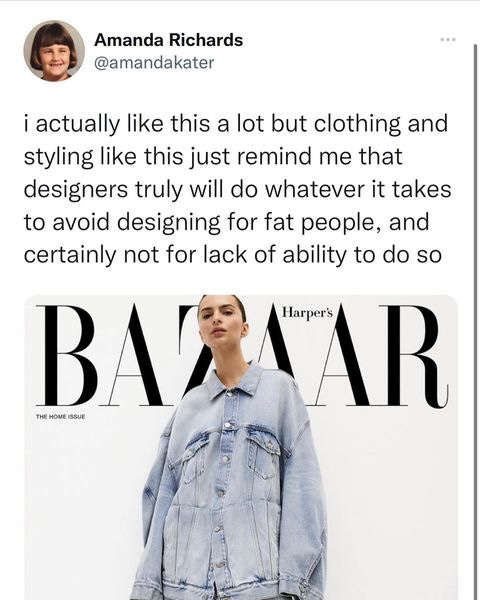
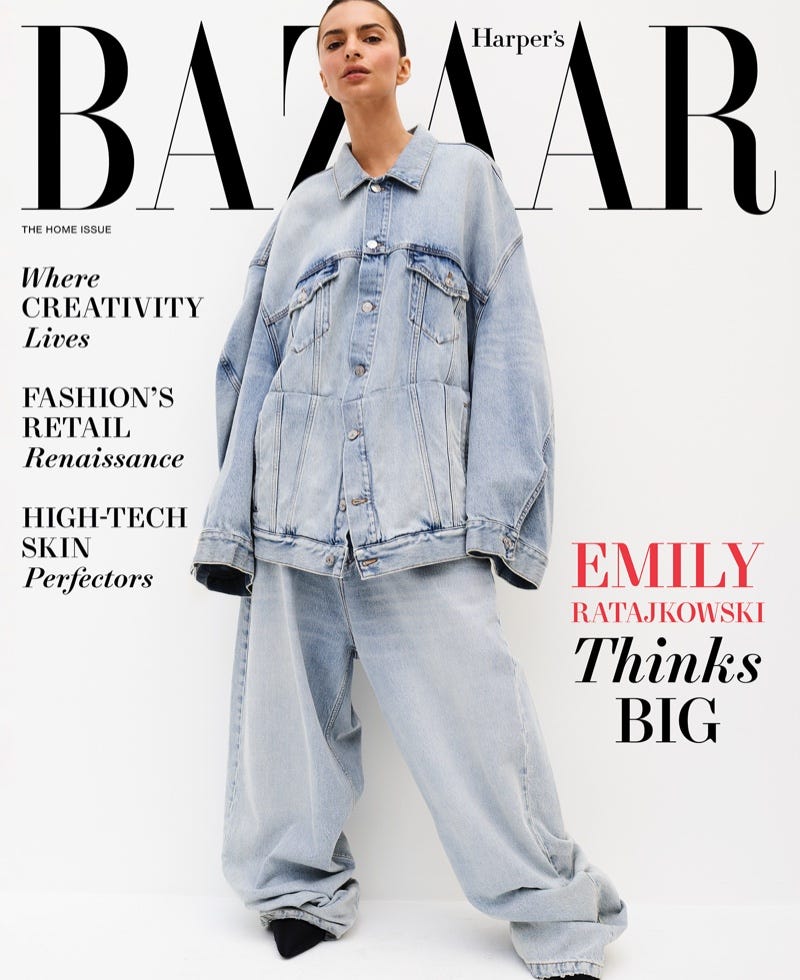
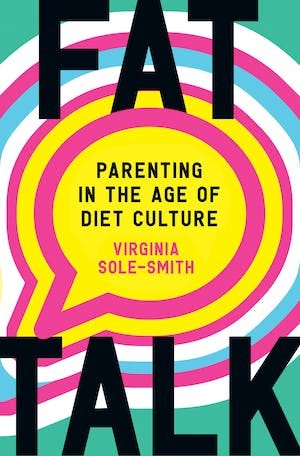
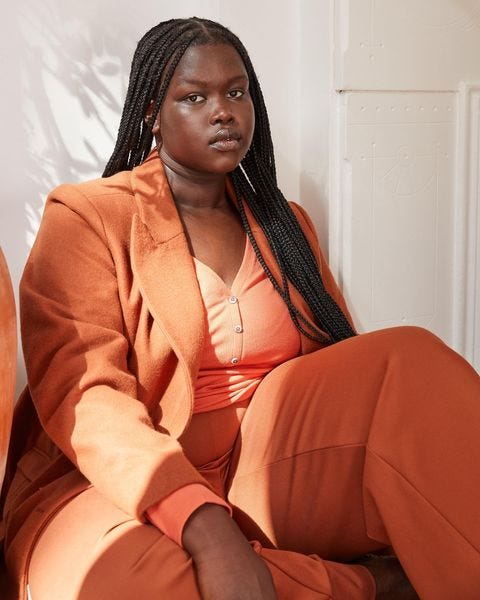
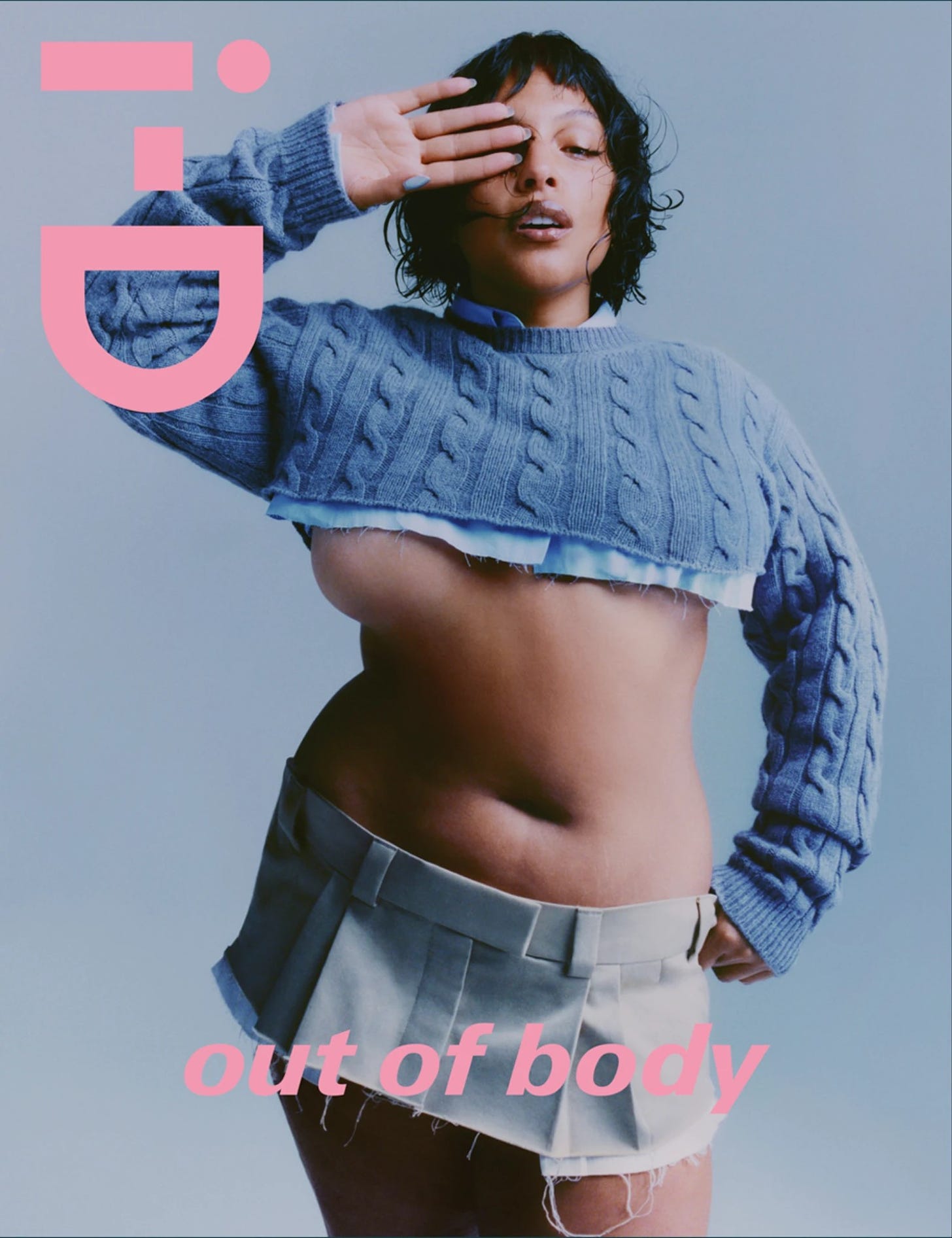
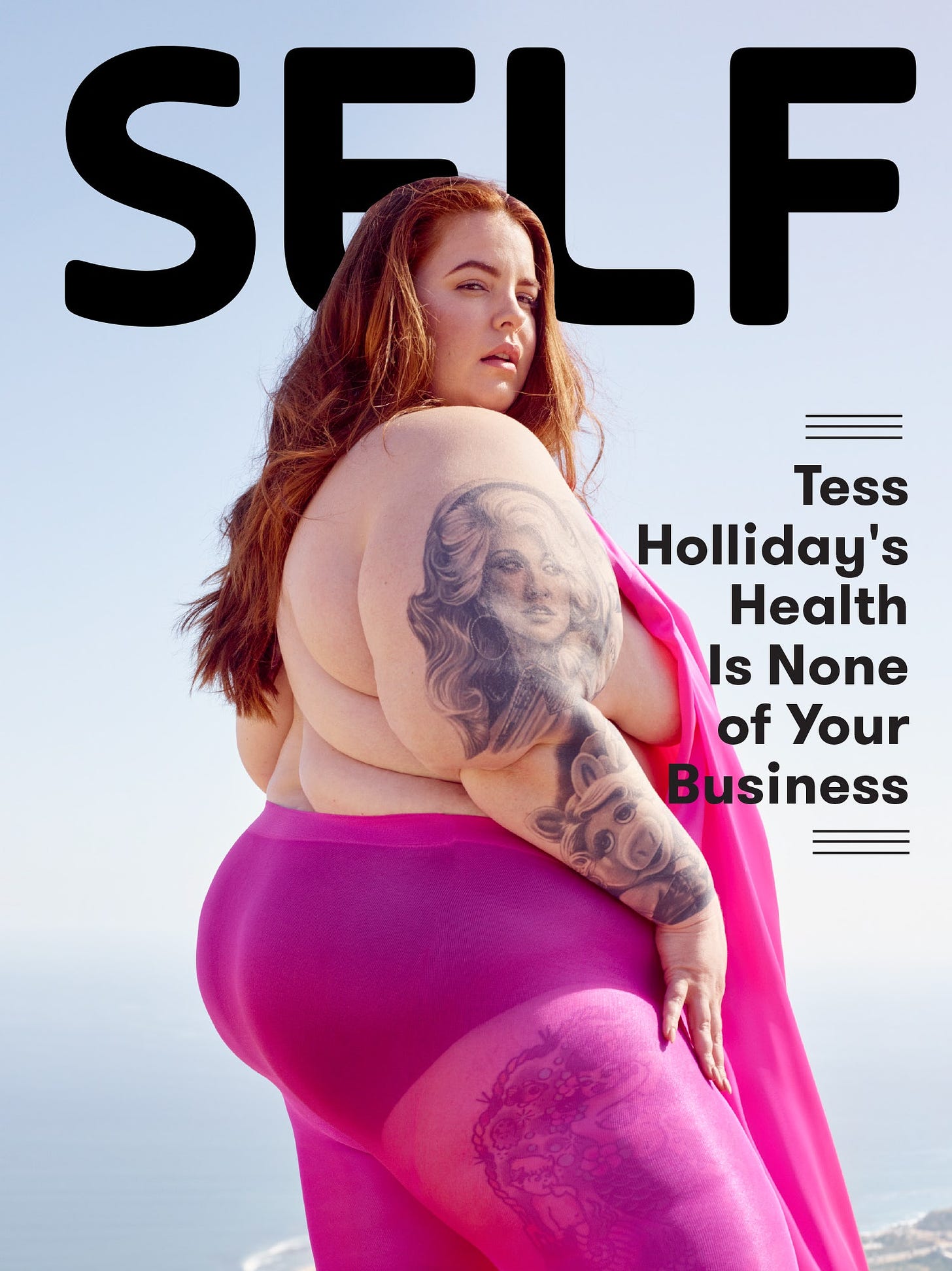


I think Virgina – whom I love, her podcast is great and I think she's the only person with a kind of "raspy" (others would say v***l f*y) voice that's actually soothing rather than irritating – is on the money when she says it'll take thin folk to stand up and tell brands that they want fat people included in their offerings.
Right now, if you're a brand that's surviving in the fashion world and catering solely to thin people, what incentive have you to include fat people too? Sure, you might make more money EVENTUALLY but you'll have to overhaul your entire production process, from fit models to designers who know how to design for fat bodies to fabric quantities and even your warehouse space potentially. It seems easier to just try to get the thin people to buy more of what they're already into.
And that's the rub: time has shown again and again (very pertinent, albeit dramatic, example is Shein) that people don't care about things that don't affect them, and it's very rare that we'll actually take a stand and stop doing or eating or buying something we like EVEN IF it's damaging other people.
Make those other people FAT people – that is, a group that is still roundly and constantly discriminated against in almost every sphere, and not only that but said discrimination is ACCEPTED because people just think fat people are somehow "at fault" for being fat in the first place – and the likelihood of thin people taking a stand on their behalf becomes infinitely lower.
It's so depressing but, honestly, I can't see it changing any time soon.
I didn’t think we’d still be talking about fashion’s anti-fat bias today (since the first wave of the rebellion began in 1967!). I’d add that 34% of women in the USA are under 5’4” and 13% of the group are under 130lbs, size 6?! Nope. So who is the fashion industry’s target demographic and how can the industry survive on such a small slice of the population?